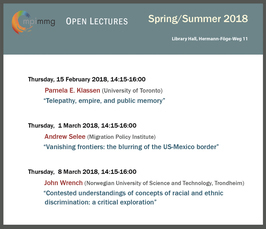"Vanishing frontiers: the blurring of the US-Mexico border"
Open Lectures Spring/Summer 2018
- Date: Mar 1, 2018
- Time: 02:15 PM - 04:00 PM (Local Time Germany)
- Speaker: Andrew Selee (Migration Policy Institute)
- Andrew Selee became President of the Migration Policy Institute (MPI), a think tank focused on migration processes and policies around the world, in August 2017. MPI is headquartered in Washington, DC with offices in Brussels and New York. Previously, he served as the Executive Vice President of the Woodrow Wilson International Center for Scholars in Washington, DC, as the Center’s Vice President, and as the founding Director of the Center’s Mexico Institute. In 2017 he was awarded the Andrew Carnegie Fellowship to finish the book Vanishing Frontiers, which will be published by PublicAffairs/Hachette in June 2018. His previous books include What Should Think Tanks Do? A Strategic Guide to Policy Impact (Stanford University Press, 2013), The Politics of Partnership: The United States and Mexico (Lynne Rienner Publishers, 2013, edited with Peter H. Smith), Decentralization, Democratization, and Informal Power (Penn State University Press, 2011), Mexico’s Democratic Challenges (Stanford University Press, 2010, edited with Jacqueline Peschard), and Decentralization, Democratic Governance, and Civil Society in Comparative Perspective (Johns Hopkins University Press, 2003, edited with Philip Oxhorn and Joseph Tulchin). Selee holds a PhD in Policy Studies from the University of Maryland, and he taught courses from 2006 to 2016 at both Johns Hopkins University and George Washington University.
- Location: MPI-MMG, Hermann-Föge-Weg 11, Göttingen
- Room: Library Hall

For more details please contact recke(at)mmg.mpg.de.
US President Donald Trump made building a wall on the US-Mexico border a central promise of his political campaign, and it remains an essential part of immigration negotiations in Washington, DC, but Andrew Selee, in a forthcoming book, argues that the border between the two countries has actually been blurring for some time as the two countries become increasingly engaged and intertwined. Border cities have begun to think of each other as shared spaces, the manufacturing industries are largely integrated, and migration has transformed cultures on both sides of the border to more closely resemble each other in surprising ways. The idea of building a wall comes too late to truly fend off these changes and is likely a reaction to this larger integration process, which is not wholly dissimilar from other relationships between neighboring countries around the world in a period of globalization.
Co-organized by the Department of Ethics, Law and Politics and the Department of Socio-Cultural Diversity